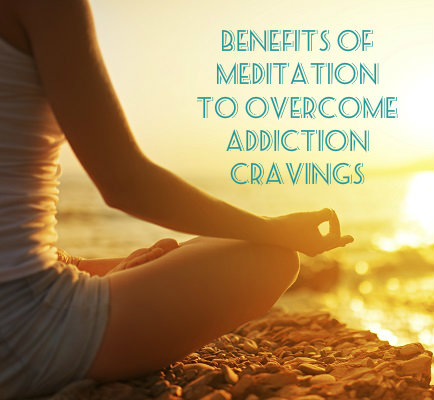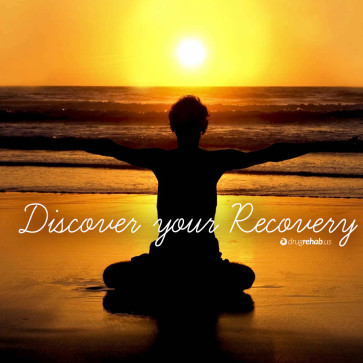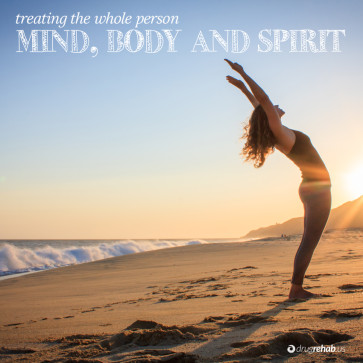21 Oct 2014
Using Meditation To Combat Addiction Cravings?
More people these days are turning to alternatives in medicine and wellness. Many of these alternatives come from Eastern cultures. Addiction is one disease that can be treated successfully with a variety of techniques from traditional Western medicine, holistic practices, and Eastern philosophy and spirituality. If you are a recovering addict and you battle cravings, consider borrowing from the Eastern tradition. Meditation is an ancient practice with usefulness in modern times. Practicing medication can reduce your stress levels, make you more aware of your mind and body and help you resist the urge to relapse.
What Is Meditation?
 Meditation is a practice that people have been using for millennia but has only recently been recognized by modern medical practitioners and researchers. The original purpose of meditation was to connect with the spiritual and mystical life forces. Many people today use the practice to relax and relieve symptoms of stress.
Meditation is a practice that people have been using for millennia but has only recently been recognized by modern medical practitioners and researchers. The original purpose of meditation was to connect with the spiritual and mystical life forces. Many people today use the practice to relax and relieve symptoms of stress.
In meditation you focus your attention and your thoughts on the present moment. This is achieved by focusing on your breathing, an incantation or an image. You ignore and quiet all of the thoughts that normally flood your mind throughout the day and enter a state of deep relaxation.
The Benefits Of Meditation For Recovering Addicts
The immediate and general benefits of meditating are an overall sense of well-being, calmness and relaxation, as well as a release of stress. The effects carry on beyond the meditation exercise.
Physical Benefits
Medical research has shown that meditation can help to manage symptoms of illnesses including:
- heart disease
- asthma
- insomnia
- pain
- high blood pressure
- cancer and anxiety disorders
Emotional And Mental Benefits
In addition to the physical benefits, meditation is also known to produce positive emotional outcomes and this is where the exercise can really help you manage your drug or alcohol cravings. Meditating can help you gain perspective on difficult situations. If you have an intense craving, stop to meditate. It will help you realize that your cravings will pass and that you need not give into them.
Meditation also helps you to improve your sense of self-awareness. Another word for this is mindfulness. If you can become more aware of what your mind and body are telling you, you can better forestall your cravings. You may realize, for instance, that stress or worry about something at work is driving your craving. If you solve that problem, your craving will lessen.
Meditation is a powerful tool for stress management. Stress is a big trigger for relapse. If you can learn how to use tools, like meditation, to manage your stress, you will be more successful at resisting the urge to use again. In addition to stress management, meditating reduces all negative emotions. There are many negative feelings that can trigger a relapse: anxiety, depression, fear, loneliness. If you can reduce these through meditation, you can reduce your cravings.
Meditation is a practice that is open to anyone. It requires no special skills, no equipment and no instruction. Working with someone experienced in meditation is not a bad idea if you feel you need guidance, but it isn’t necessary. Meditation can be as simple as sitting comfortably in a quiet place and focusing on your breathing. Also realize that you will get more adept at meditating with time and practice. Don’t expect to be able to fully relax and block out external factors on your first try. Give it time.
Meditation is not a cure for addiction or for anything, but it is a useful tool. As an addict in recovery you need all the tools you can get to help you avoid a relapse. Cravings are powerful and intense, but meditation can help you fight them. Give it a try and see how much better you feel in general.
Discover The Benefits Of Holistic Drug Rehab
Although we know that addiction is a chronic disease of the body and the mind, developing effective treatments for it has taken decades of research and is far from perfected. There is no one right way to treat addiction. Practitioners of holistic medicine believe in treating the whole person, rather than treating a single disease or illness. If you have been struggling with addiction and traditional treatments have not been successful, consider seeking the help of a trained and experience practitioner of holistic medicine.
What Is Holistic Medicine?
The philosophy behind holistic medicine is treating the whole person. In traditional Western medicine, physicians treat a disease, first and foremost. A holistic practitioner gets to know the patient as an individual and considers his mental, physical and spiritual health, as well as the particular disease to be treated. The practitioner believes that many aspects of a patient’s life have become unbalanced and seeks to rebalance them.
Holistic medicine also means using preventive measures and many different medical techniques that complement each other. These are not limited to traditional medicine only.
Holistic Techniques And Addiction
Holistic medicine is well suited to treating addiction because, unlike many physical conditions, addiction cannot be treated with a course of medication or any other single technique. Treating addiction is a lifelong process and needs to be individualized to each patient. Holistic caregivers are trained in the practice of assessing each patient as an individual and developing a treatment plan that addresses the disease as well as overall wellness.
Many of the techniques used in holistic medicine can help you to find relief from withdrawal symptoms. They can reduce stress, anxiety and depression symptoms, any of which may lead to relapse if ignored. They can also improve your overall health, which is a powerful way to avoid relapsing.
Some of these techniques include acupuncture and acupressure, biofeedback and neurofeedback, herbal medicines, hypnosis, meditation, yoga, exercise, dietary and nutrition changes and Qigong, an ancient Chinese practice involving the balance of Qi, or energy.
Unfortunately, the research on how effective holistic medicine is in treating addiction is scarce. As medicine changes and evolves, perhaps more researchers will be willing to look into the alternative practices used by holistic practitioners. Until then you may simply want to try a holistic approach and see if it works for you. If you work with a trained and experienced practitioner, there is no harm in trying. The vast majority of techniques used in holistic medicine are safe and risk-free.
Finding A Holistic Practitioner
The best way to get the most out of holistic medicine is to seek help from the right practitioner. In the hands of someone who is untrained or inexperienced, you may not see any benefits and in a worst-case scenario you could be harmed. Start with your primary care physician for a referral. If your doctor has no one to refer, consider looking at professional organizations for holistic medicine practitioners. Always select someone who has been trained. Also look for someone who has worked with addicts. This type of experience will be invaluable.
When you go to your first appointment with a holistic medicine practitioner, consider it an interview. You need not come back if you don’t feel comfortable. The person working with you should assess your whole health, not just your addiction. He should ask you lots of questions and make you feel comfortable.
Holistic medicine is considered to be an alternative to traditional medicine, but it need not replace it. You can still seek help from a physician, go to rehab and work with a drug counselor while also working with a holistic practitioner. A true professional will work with you to integrate all of these types of care for your greatest benefit.
We recommend Promises Austin Luxury Rehab. They treat both men and women effectively and holistically, in a beautiful and private setting, with an excellent client-to-staff ratio!
07 Aug 2014
The Place For Alternative Medicine In Addiction
Alternative medicine is gaining popularity as people begin to turn to natural practices in medicine, many of which have been used for centuries in cultures around the world. Some prefer to use alternative medicine, while others turn to practitioners when modern medicine has failed. Today, alternative medicine touches all areas of healing, including addiction. Many rehab facilities are beginning to incorporate some of these techniques.
What Is Alternative Medicine?
Among the different terms referring to alternative medicine, a few stand out. Alternative refers to any practice outside mainstream, modern, Western medicine. Some prefer the term holistic medicine, which means treating the whole person instead of treating a disease or a set of symptoms alone. Holistic approaches use many alternative practices. Complementary medicine is another term commonly used. These are alternative medicine practices that are used in conjunction with traditional treatments.
What Kinds Of Alternative Therapies Are Used For Addiction Treatment?
 Alternative medicine encompasses a variety of practices from ancient Chinese herbal remedies to modern biofeedback equipment. A few of these have found a place in addiction rehab and have helped some people in their battle to give up drugs or alcohol. Acupuncture, which comes from traditional Chinese medicine, is a practice that involves inserting thin needles into the skin. Acupuncture is believed by some to help reduce cravings and the urge to relapse.
Alternative medicine encompasses a variety of practices from ancient Chinese herbal remedies to modern biofeedback equipment. A few of these have found a place in addiction rehab and have helped some people in their battle to give up drugs or alcohol. Acupuncture, which comes from traditional Chinese medicine, is a practice that involves inserting thin needles into the skin. Acupuncture is believed by some to help reduce cravings and the urge to relapse.
Meditation and yoga are also often used as components of addiction treatment. Both come from ancient India and are great for relaxation and stress relief. Yoga is a type of exercise that involves using controlled movements. Research has proven that yoga helps people manage stress. When you can reduce stress in your life you can better resist the urge to abuse substances. Meditation has a similar effect; it helps focus the mind and control will. Turning to meditation when craving occurs can be a very powerful and effective tool.
Other types of alternative medicine may be used during addiction treatment, although research as to their effectiveness is limited. Some of these include art therapy, equine therapy (working with horses), massage therapy, herbal supplements, prayer or spiritual enrichment and hypnosis. Some rehab facilities may also use biofeedback and neurofeedback. These are techniques that use equipment to measure body and brain processes so that you can learn to control them. In neurofeedback, brain waves are retrained to a normal pattern to help reduce cravings.
Should I Use Alternative Medicine To Help Treat Addiction?
Whether alternative medicine practices can help you overcome addiction is uncertain. There is evidence for some of the more common practices like yoga and meditation, but others have received limited attention from researchers. For the most part, these practices are safe and it can’t hurt to try them. If they work for you and help you to stay sober and resist cravings, use them.
Only choose to participate in alternative medical care from experienced practitioners. If certain techniques are of interest, speak to your therapist, clinical team or doctor to get resources for practitioners who have worked with addicts. Most techniques are safe, but in the wrong hands there could be consequences or side effects. Also remember that alternative medicine should be used only in addition to primary addiction treatment. It is also necessary to keep up with therapy or support group sessions. The combination of traditional and alternative medicine, however, may prove to be just the right plan that works for you.
Read Our Other Posts On Addiction Recovery!


